With sneaker culture booming and limited-edition drops selling out in seconds, platforms like StockX have become a go-to destination for hype-driven resellers and collectors. But as the resale economy grows, so does the skepticism around authenticity, inflated prices, and order disputes.
Many buyers turn to StockX for peace of mind, thinking its “authentication” model offers better safety than peer-to-peer platforms. Still, reports on Reddit, Trustpilot, and Twitter tell a mixed story about flawless transactions, lost packages, and claims of fake items slipping through. So, is StockX legit? Let’s break it down.
What is StockX?
StockX is a Detroit-based resale marketplace launched in 2016 that specializes in sneakers, streetwear, electronics, and collectibles. What sets it apart is its “stock market” style model, buyers place bids, sellers list asks, and StockX authenticates every item before it ships to the buyer.
The platform acts as a middleman, holding the product until it passes a verification process. StockX has millions of users globally, with over 1,000 employees and dedicated verification centers worldwide. But, like most large-scale reselling platforms, its operational model has limitations that affect customer satisfaction.
Is StockX Legit and Safe to Use?
Yes, StockX is a legitimate, functioning business, backed by investors like Google Ventures and celebrities. The platform handles millions in monthly transactions and applies strict authentication policies before releasing items to buyers.
From a tech and payment perspective, StockX uses HTTPS encryption, secure payment processors, and offers order tracking. But its legitimacy doesn’t always translate to 100% buyer satisfaction. While most buyers receive authentic products, a growing number report issues like fake items, delayed shipping, or denied returns.
Ultimately, StockX is safe to use, but it's not immune to human error, third-party seller deception, and logistical failures.
StockX’s Authentication Process Explained
StockX’s biggest selling point is its in-house authentication. Before an item reaches the buyer, it must pass through a verification center where it’s checked by trained specialists.
How It Works:
- The seller ships the item to StockX.
- StockX authenticators review it for signs of counterfeiting, wear, or damage.
- If the item passes, StockX ships it to the buyer. If not, the order is canceled and the seller is penalized.
This process adds a layer of trust, but it’s not foolproof. Some X users have documented counterfeit items that passed, especially during high-volume drops or limited-edition releases.
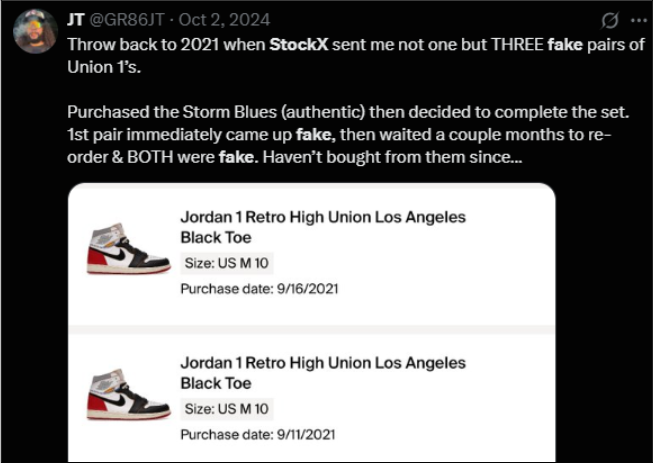
StockX does not offer refunds for authentication errors unless your claim fits specific conditions, which can leave buyers stuck with items they believe to be fake.
Common StockX Scams and Risks to Watch Out For
StockX works differently from traditional e-commerce and can have different risks. While scams are rare due to their middleman model, buyers still face certain issues:
1. Fake or Misidentified Products
Even though StockX authenticates items, no system is perfect. Verified Reddit threads are showing fake sneakers with incorrect stitching, missing labels, or mismatched packaging, making it through.
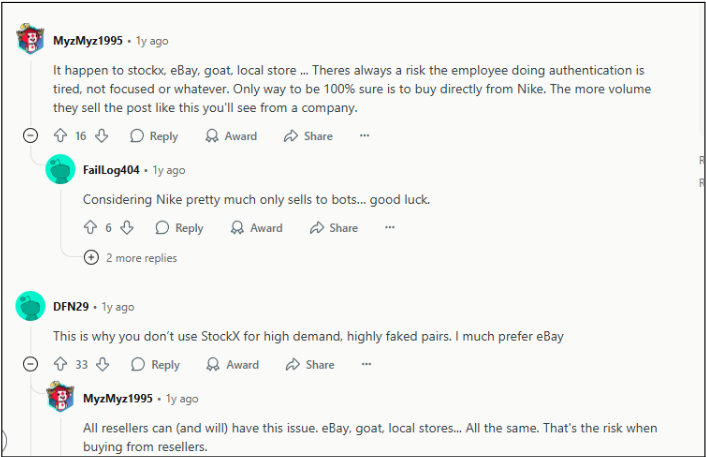
2. Lost or Delayed Deliveries
Sometimes items get stuck at authentication centers or are lost in transit between the seller, StockX, and the final buyer. When this happens, StockX may take weeks to investigate, and often offers site credit instead of a refund.

3. No Returns or Exchanges
StockX doesn’t allow returns once you’ve received an authenticated item. Even if the sizing is wrong or you're unhappy with the condition, you're stuck with it, unless you re-list it for sale.
4. Bait-and-Switch Sellers
Some sellers may try to ship items that don’t match the exact condition listed. StockX tries to catch these discrepancies, but a few slip through, especially with used or “deadstock” items.
Buyer Protections, Seller Responsibilities & Legal Limitations on StockX
StockX doesn’t fall under the same consumer protection laws as platforms like Amazon. When you purchase an item, you're entering a binding agreement, and once authenticated, the sale is considered final.
For Buyers:
- No cancellations after order confirmation.
- No refunds unless the item fails authentication or is lost.
- Site credit is often the fallback compensation.
For Sellers:
- Items must be shipped within two business days.
- Authenticity and condition must match StockX standards.
- Penalties apply for fake or undelivered items.
Because of the resale structure, legal recourse for disputes is limited unless you can prove negligence or fraud, which is hard once an item has passed StockX’s internal checks.
Are StockX Products 100% Authentic?
StockX claims to have authenticated over 40 million products, including sneakers, streetwear, and even luxury watches. But no system is perfect. Human error, counterfeit evolution, and logistical scaling have all led to fakes slipping through.
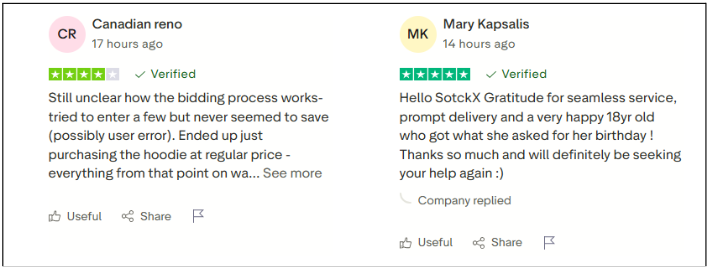
There have been multiple complaints on Reddit and Twitter from users claiming that:
- The shoes arrived without the correct box or tags.
- Logos or stitching didn’t match verified originals.
- Items were worn or previously used.
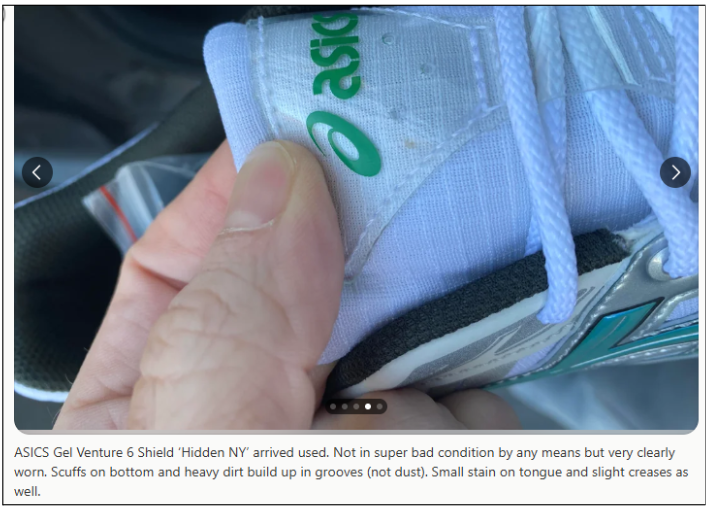
While most orders are legitimate, the rare exceptions raise serious concerns for high-value purchases. If you're buying sneakers that retail for $500+, it's wise to double-check every detail upon arrival.
How to Check If a StockX Item is Authentic?
Once you receive your item:
- Inspect the item under natural light for stitching, labels, and box consistency.
- Compare it to official brand photos or YouTube reviews.
- Use legit-checking forums like Reddit’s r/Repsneakers or services like Legit App.
- Scan the StockX tag QR code, though it's not definitive proof.
Keep all packaging, receipts, and the green StockX tag until you’re sure the item checks out.
How to Avoid Getting Scammed on StockX
Even though StockX handles most of the risk, here’s how to protect yourself:
- Avoid Suspiciously Low Prices: If a Yeezy 350 is $100 cheaper than the lowest ask, it’s probably bait.
- Check Seller History (if visible): Some third-party data aggregators can show seller behavior.
- Verify Product Details Upon Arrival: Unboxing videos help in case of disputes.
- Use Credit Cards: They offer better fraud protection than debit cards.
- Report Issues Immediately: StockX has a 3-day window to file complaints after delivery.
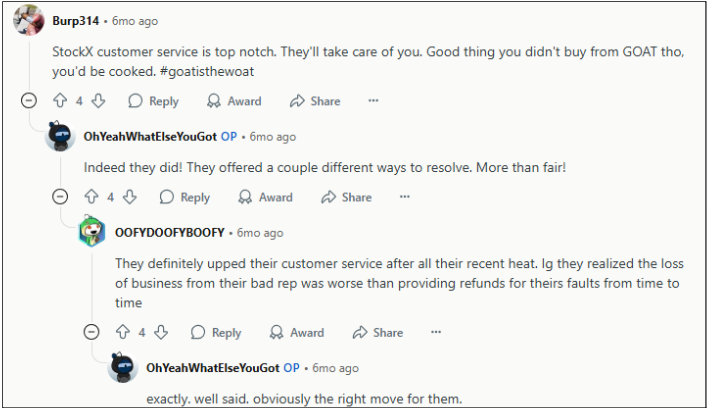
Is It Safe to Use a Credit Card on StockX?
Yes, StockX supports secure payment gateways, including Visa, Mastercard, Apple Pay, and Google Pay. They use HTTPS encryption and tokenized transactions, so your payment data is encrypted during checkout.
Plus, using a credit card adds another layer of security. In case of fraudulent charges, your bank can reverse transactions, something not guaranteed with debit cards or bank transfers.
Does StockX Protect Your Data?
StockX collects your name, address, billing info, and occasionally, personal ID for high-value orders. While the company follows GDPR and U.S. privacy regulations, there have been past data breaches.
In 2019, over 6.8 million StockX user accounts were compromised in a cybersecurity breach. Since then, the platform has updated its security infrastructure, but it’s a reminder to use strong passwords, enable two-factor authentication, and avoid saving card data on your account.
Tools to Verify Products Outside StockX
If you’re extra cautious, consider using the following to verify the products:
- Legit Check App: Community-based review system for sneakers and apparel.
- CheckCheck: Paid service for quick sneaker authentication via photo upload.
- Reddit Threads: Active communities like r/FashionReps and r/Repsneakers offer crowdsourced legitimacy checks.
These tools can help validate items received from StockX, especially if the product is high-value or from a hyped drop.
StockX vs GOAT • vs eBay • vs Stadium Goods
Let’s compare StockX to other resale platforms:
| Platform | Return Policy | Authentication | Seller Type | Pricing | Fake Risk |
| StockX | Final Sale | Yes (in-house) | Anonymous Sellers | Market-based | Moderate |
| GOAT | Limited Returns | Yes | Individual/Pro | Competitive | Low-Moderate |
| eBay (Auth.) | 30-Day Returns | Yes (select) | Anyone | Varies widely | Moderate-High |
| Stadium Goods | Final Sale | Yes | Professional | Higher | Low |
StockX stands out for its transparent pricing model and verification system, but GOAT offers better customer service and return flexibility.
How to Shop Safely on StockX
Shopping on StockX can be rewarding, but it’s not without risks. With no return policy and occasional authenticity concerns, it’s essential to be proactive. To minimize risk when using StockX:
- Buy from Sellers with Fast Ship History (check delivery speed rating).
- Avoid High-Risk Drops unless you're willing to gamble.
- Document the Unboxing process with video for dispute leverage.
- Use Third-Party Authenticators if you’re unsure about legitimacy.
- Act Fast on Disputes, you only have 72 hours to report an issue.
- Don’t Store Card Info and enable 2FA for account security.
StockX Return & Refund Policies
StockX follows a strict “Final Sale” policy. That means once your item is authenticated and shipped, you can’t return it, even if it doesn’t fit or you change your mind. But there are certain exceptions:
- Item fails authentication → full refund.
- Item never arrives → refund or site credit.
- Items arrive damaged or incorrect → refund only if a claim is filed within 72 hours.
To file a claim:
- Go to “My Account” → “Orders” → “Issue with Product.”
- Upload detailed photos and explain the issue.
- Wait for StockX to investigate (usually 3–10 days).
- A refund is issued via original payment or as site credit.
Claims Denied Due to Insufficient Evidence
When filing a complaint, such as for receiving a damaged or incorrect item, StockX requires photo or video proof. If the buyer fails to provide clear, timestamped, or detailed evidence, the claim may be rejected. Unboxing videos and close-ups of the product are often essential to validate the case.
No Refund for Buyer’s Remorse or Incorrect Sizing
StockX follows a strict "Final Sale" policy. This means if you change your mind about a purchase or order the wrong size, you cannot return or exchange the item. Even if the product is unworn and in perfect condition, StockX does not accommodate returns for these reasons.
Site Credit Instead of Cash Refund
In some cases, especially for shipping delays, lost packages, or minor order issues, StockX may offer compensation in the form of site credit rather than refunding your original payment. While this allows you to make future purchases, it may not be ideal if you prefer a full monetary refund.
Wrap Up
StockX is a professionally run platform with a strong authentication process and millions of loyal customers. But buyers must understand the fine print: no returns, occasional authentication slip-ups, and strict policies. If you’re cautious, use credit cards, and inspect your product carefully, StockX is a solid platform for scoring exclusive items.
Frequently Asked Questions
-
Is StockX trustworthy?

Yes, StockX is a reputable marketplace used by millions. But trust is limited by its final sale policy, which restricts buyer flexibility. Authenticity checks add credibility, but human errors can still occur occasionally.
-
Can you get scammed on StockX?

While rare, it’s possible. Scams often involve fakes slipping past authentication or shipping errors. Always inspect products and report problems immediately.
-
Does StockX sell fakes?

StockX claims it doesn’t, but documented cases exist where fakes passed authentication. The process is strong but not 100% foolproof.
-
Why are StockX prices so high?

StockX prices are set by market demand. Rare drops, limited editions, and hype culture drive costs higher than retail.



